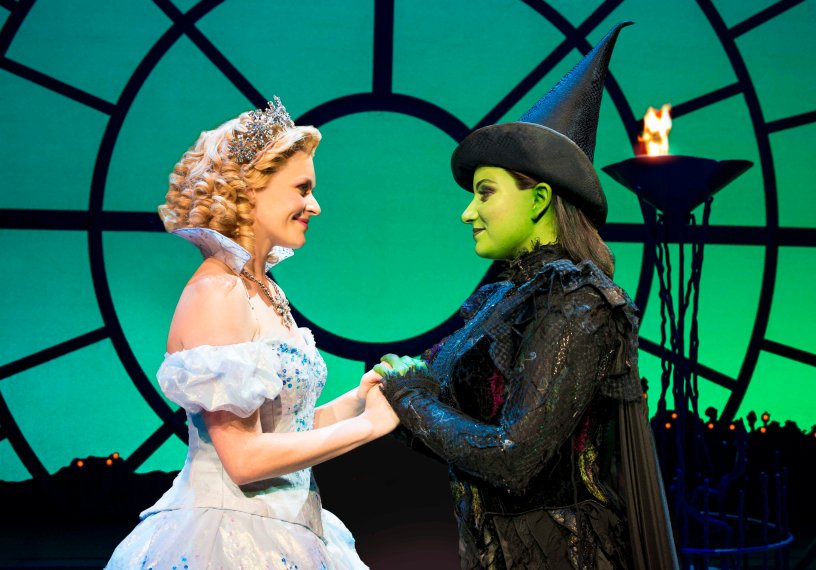Speaking of Wicked.
I’d be remiss not to mention the most famous Broadway musical of all time. (Sorry, Rent and Hamilton!)
There’s a lot to love about the on-stage production, namely the two female leads who pass the Bechdel test with flying colors. One of my favorite things is the handling and improvement of Glinda’s character.
“Defying Gravity” is a vocally difficult song, and its powerful message about choosing your own path despite the haters who would bring you down hits us hard in the feels. Because of these strong features, one thing that gets easily glossed over is this beautiful moment in the middle:
“You can still be with the Wizard, what you’ve worked and waited for.
You can have all you ever wanted…” “I know. But I don’t want it.
No- I can’t want it anymore.”
“I hope you’re happy, now that you’re choosing this.“
“You too.” “I hope it brings you bliss.”
“I really hope you get it, and you don’t live to regret it.
I hope you’re happy in the end… I hope you’re happy, my friend.”
This is a very poignant microcosm about womanhood and making one’s way in the world.
Glinda chooses to follow the traditional path, to stay with the Wizard instead of Defying Gravity with Elphaba. She chooses to pursue what she’s worked and waited for, to play the game of politics from inside the machine. And Elphaba doesn’t resent her for this, even though she cannot in good conscience make the same decision. They each understand that the other is making the choice that is best for them as a different person.
In “For Good,” Elphaba admits that on her chosen path of rebellion, there are ways in which she is now “limited,” saying:
“And look at you, you can do all I couldn’t do, Glinda.
So now it’s up to you, for both of us.”
In the book, Madame Morrible tries to hypnotize Elphaba, Glinda and co. when they confront her about Doctor Dillamond’s death. Elphaba is fairly resistant to the spell, and while it does prevent her from speaking about the event she can at least correctly recall what happened. Glinda on the other hand, easily falls victim and Morrible installs her as a political puppet in the Uplands. When Elphaba runs into her later in the book, her character is much unchanged. She has married well and continued to live a cushy life (similar to the musical).
I prefer how in the musical version of the story, Glinda chooses her own fate.
One can certainly argue that Glinda is still a political puppet for Madame Morrible and the Wizard of Oz in the musical version. However, we hear her do her best to advocate for Elphaba from her position:
“Are people born wicked? Or do they have wickedness thrust upon them?”
And we hear her make the conscious decision in “Thank Goodness” to uphold the story that Morrible publishes, reflecting on the personal costs one pays for things like power.
“Though it is I admit, the tiniest bit, unlike I anticipated.
Getting your dreams, it’s strange but it seems a little well, complicated.
Who wouldn’t be happier? I couldn’t be happier
Because happy is what happens when all your dreams come true.
Well, isn’t it?”
This personal reflection and agency makes a huge difference in the character and her impact on the story, especially in her position as the narrator. She closes out the “Finale” reprising the motif:
“Who can say if I’ve been changed for the better? Because I knew you…”
Even as the Company cries:
“No one mourns the wicked!”
Gregory Maguire’s original text has a lot of political and philosophical depth that just doesn’t translate to the stage. I love both versions of the story of Wicked, because the book and the musical production each lend the unique strengths of their own medium to the narrative. What I adore about the Broadway script is the deep and nuanced friendship between Elphaba and Glinda which simply doesn’t exist in the original book, the main difference to the story that I feel is a marked improvement.
But I want to highlight not just the depth and agency added to Glinda’s character, but the specific exchange in “Defying Gravity” about respecting the different paths people can take to achieve their goals and be true to themselves.
I feel this especially as a woman in the 21st century, so soon after women have entered the workforce and gained the rights to things such as voting, bank accounts, and property ownership. I have deep respect for women who choose to follow the traditional path of marriage and depending on a man for security, because this is a well-established path for women and there is a long history of women finding both power and happiness in this position. I also have deep respect for women who work to support themselves and blaze the trails of socioeconomic agency. Neither choice is superior, there are different ways for different women to make their way in the world depending on their desires and circumstances.
Feminine holds space for both these choices and more, believing in women’s strength and agency to choose the path that is best for them as individuals.
The stories we tell ourselves shape what we believe we are capable of, and they impact how we feel about ourselves and other people in the world. This is why it is so important to write and perform stories with powerful female leading characters such as Wicked.
